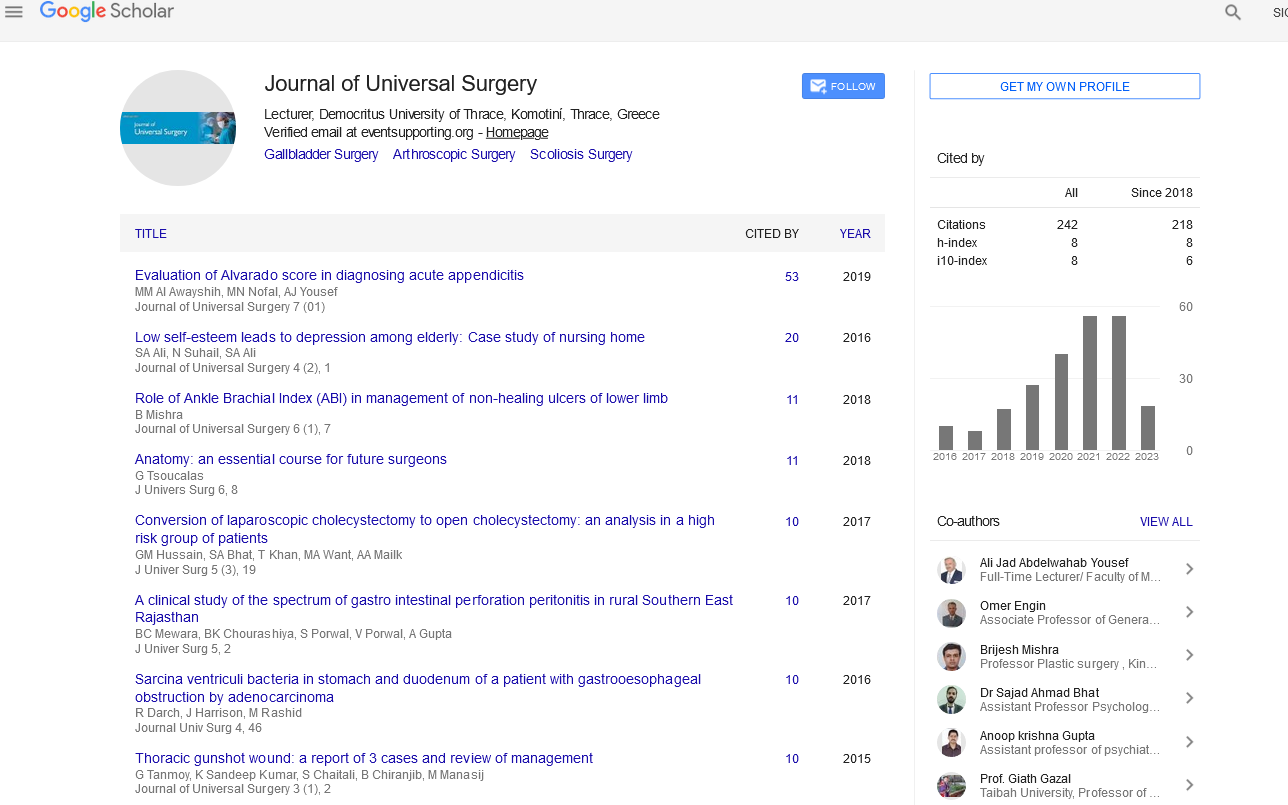Perspective - (2024) Volume 12, Issue 6
Precautions to Take Before Arthroscopic Knee Surgery
Martin Souqick*
Department of General Surgeon, Kazimierz Dolny University, Kazimierz Dolny, Poland
*Correspondence:
Martin Souqick, Department of General Surgeon, Kazimierz Dolny University, Kazimierz Dolny,
Poland,
Email:
Received: 26-Nov-2024, Manuscript No. IPJUS-24-15364;
Editor assigned: 29-Nov-2024, Pre QC No. IPJUS-24-15364 (PQ);
Reviewed: 13-Dec-2024, QC No. IPJUS-24-15364;
Revised: 21-Dec-2024, Manuscript No. IPJUS-24-15364 (R);
Published:
29-Dec-2024
Introduction
Implant surgery is a transformative procedure that can restore
function, enhance aesthetics, and improve the quality of life for
patients. Whether it's dental implants, orthopedic implants, or
cosmetic implants, the procedure involves detailed planning and
preparation. One of the most critical phases of this process is the
preoperative stage, where patients must adhere to specific
precautions to ensure a successful outcome. This article explores
the essential measures patients should take before undergoing
implant surgery.
Description
Consultation and comprehensive evaluation
Before any implant surgery, an initial consultation with a
qualified surgeon is indispensable. Patients should ensure they:
Provide a detailed medical history: Share complete details of
past surgeries, current medications, allergies, and pre-existing
conditions such as diabetes, hypertension, or autoimmune
disorders.
Undergo diagnostic tests: Blood tests, imaging scans (like Xrays,
CT scans, or MRIs), and other evaluations help the surgeon
assess bone density, tissue health, and overall suitability for the
implant.
Discuss goals and expectations: Having a realistic
understanding of the outcomes is crucial to align expectations
with achievable results.
Preoperative lifestyle adjustments
Lifestyle choices significantly influence the success of implant
surgeries. Patients should make the following adjustments well
in advance:
Quit smoking and alcohol consumption: Smoking impairs
blood circulation, slows wound healing, and increases the risk of
implant failure. Similarly, excessive alcohol can interfere with
anesthesia and recovery.
Maintain a balanced diet: A nutrient-rich diet aids in building
immunity and improving the body's healing capabilities. Focus
on foods rich in vitamins C and D, calcium, and protein.
Hydration: Adequate hydration supports cellular functions
and prepares the body for surgery.
Medication management
Patients must discuss their current medication regimen with
their surgeon. Key considerations include:
Discontinuing certain medications: Blood thinners like aspirin
or anticoagulants may need to be stopped temporarily to reduce
the risk of excessive bleeding.
Adjusting chronic disease medications: Patients with
diabetes, hypertension, or thyroid conditions may require
modified dosages to stabilize their condition before surgery.
Antibiotics and prophylaxis: In some cases, antibiotics may be
prescribed to prevent infection. Patients should strictly follow
the surgeon’s instructions regarding pre-surgical medication.
Oral hygiene and dental care (For dental implants)
For patients undergoing dental implant surgery, oral hygiene
plays a pivotal role:
Professional cleaning: Visiting a dentist for scaling and
cleaning eliminates plaque and reduces bacteria in the oral
cavity.
Treating pre-existing conditions: Issues like gum disease,
cavities, or infections should be addressed before the implant
procedure.
Daily hygiene practices: Regular brushing, flossing and using
an antimicrobial mouthwash create a healthier environment for
the implant.
Physical preparation
Ensuring the body is in optimal condition minimizes surgical
complications:
Exercise: Engaging in light exercises, as recommended by a
healthcare provider, boosts circulation and overall stamina.
Sleep: Adequate rest before surgery is essential for mental
and physical well-being.
Weight management: Obesity can increase the risk of
complications, so achieving a healthy weight may be advised.
Understanding preoperative instructions
Surgeons typically provide detailed instructions to patients
before surgery. Adhering to these is critical:
Fasting guidelines: Patients may need to avoid food and drink
for a specific period before surgery, especially if general
anesthesia is planned.
Skincare preparation: For procedures involving skin implants,
patients might be asked to cleanse the area with antibacterial
soap.
Clothing and accessories: Comfortable clothing should be
worn on the day of surgery, and all jewelry, makeup and contact
lenses should be removed.
Mental and emotional preparation
Surgery can be daunting and mental preparedness is often
overlooked. Patients should:
Discuss concerns: Sharing fears and doubts with the surgeon
can help alleviate anxiety.
Practice relaxation techniques: Methods such as deep
breathing, meditation, or yoga can reduce pre-surgery stress.
Seek support: Family or friends can provide emotional
encouragement and assistance on the day of surgery.
Logistics and post-surgery planning
Proper planning ensures a smooth recovery process:
Arrange transportation: Patients undergoing implant surgery
should have someone to drive them home post-procedure.
Prepare a recovery area: Setting up a comfortable space with
easy access to essentials like medications, water, and a phone
ensures convenience.
Time off work: Depending on the surgery type, patients may
need to schedule sufficient time off for recovery.
Addressing allergies and sensitivities
It’s vital to inform the surgeon about any allergies, including:
Material allergies: Implants are typically made of materials
like titanium or silicone. Patients should verify their
compatibility through tests.
Anesthesia sensitivities: Any past adverse reactions to
anesthesia should be disclosed to the anesthesiologist.
Conclusion
Preparing for implant surgery involves more than showing up
at the operating room. Patients must take proactive steps to
optimize their health, adhere to preoperative guidelines, and
ensure mental readiness. Following these precautions not only
reduces the risk of complications but also enhances the overall
success of the procedure. By partnering closely with their
healthcare team and staying informed, patients can pave the
way for a smooth surgical experience and a faster recovery.
Citation: Souqick M (2024) Precautions to Take before Arthroscopic Knee Surgery. J Univ Surg Vol.12 No.6: 051.





